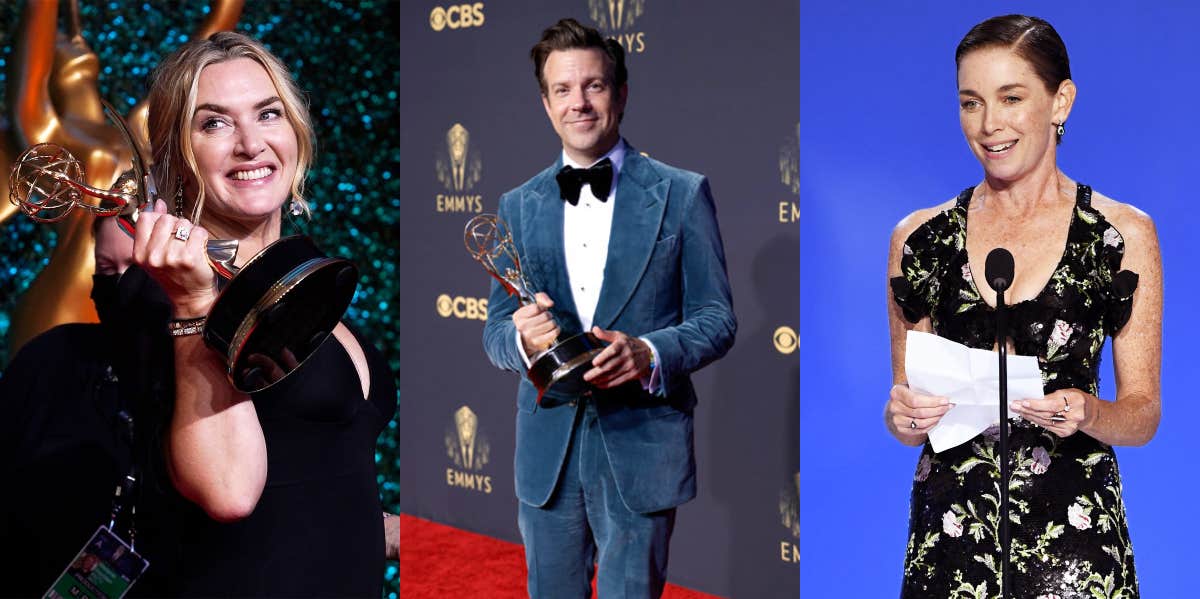Emmys Are Trying To Look Diverse But Didn't Award Any Actors Of Color
Make it make sense.
 Chris Pizello / Phil McCarten / Francis Specker / Shutterstock / CBS
Chris Pizello / Phil McCarten / Francis Specker / Shutterstock / CBS The 73rd Primetime Emmy Awards premiered last night with some big winners among the shows Ted Lasso, Mare of Easttown, and The Crown.
While some fans were grieving the major losses of Anya Taylor-Joy and The Queen's Gambit, others noticed an overwhelming trend that the awards show followed last night.
Not a single person of color won an Emmy award for acting.
While there were a few categories that appealed to actors of color and included Billy Porter, MJ Rodriguez, the late Michael K. Williams, Kenan Thompson, and Bowen Yang, none of them took home the gold statue.
Instead, white actors won all 12 leading and supporting actor categories across the nomination board.
The only Black woman to take home an award was Michaela Coel, who was nominated for four Emmys, ultimately winning the award for outstanding writing for a limited or anthology series for her show, “I May Destroy You.”
This marks the third time a Black creative has won the category and the first time for a Black woman. In her acceptance speech she dedicated her award “to every single survivor of sexual assault.”
Only one other person of color took home an award — RuPaul, winning the award for outstanding competition series with "RuPaul's Drag Race," becoming the most-awarded person of color in the history of the Emmys with 11 wins.
“Thanks to all our lovely children on our show from around the world," RuPaul said during his acceptance speech. "They are so gracious to tell their stories of courage and how to navigate this difficult life, even more difficult today. This is for you.”
But, viewers weren’t satisfied with RuPaul and Coel’s awards. People immediately took to Twitter with the hashtag #EmmysSoWhite, criticizing the lack of diversity when it came to winners during the awards ceremony.
Much of the outrage came from the fact that when the nominations for the Emmys were announced, many people were elated to the fact that people of color were nominated in many categories.
A lot of people saw promise for Billy Porter and MJ Rodriguez amid their nominations for the FX show, “Pose,” in the categories for lead actor and actress in a drama.
Consequently, their loss was a blow for not only Black nominees but LGTBQ nominees as well. Rodriguez’s win would’ve made her the first Black trans woman to win an Emmy, and Porter would’ve been the second Black man to ever win the lead actor category twice.
The Emmys is trying to look diverse, but failing miserably.
The disappointment comes after last year’s Emmys featured four actors of color winning major categories with Zendaya, Regina King, Yahya Abdul-Mateen II, and Uzo Aduba taking home the trophy.
Going from four winners last year to none this year is a massive step backwards for the diversity of awards shows.
It feels performative for the Emmys to nominate so many actors of color and put so much diversity into them just to end up snubbing them all for white actors.
That's not to say that none of the white actors deserved to win — just that there were talented Black nominees who deserved to win just as much.
It's about the Academy's history and their fake diversity agenda which has been called out in the past, unfortunately always falling on deaf ears.
The lack of winners who weren’t white shows that there needs to be more award shows catered to people of color.
Either that, or there needs to be more people of color in the rooms when deliberating on not only winners for these awards, but also nominations.
It just feels like there’s no effort to recognize and award the talented actors of color in Hollywood who are working hard to create entertainment that has meaning and value to the communities of color who watch them.
There needs to be a change, and it needs to happen now.
Nia Tipton is a writer living in Brooklyn. She covers pop culture, social justice issues, and trending topics. Follow her on Instagram.

